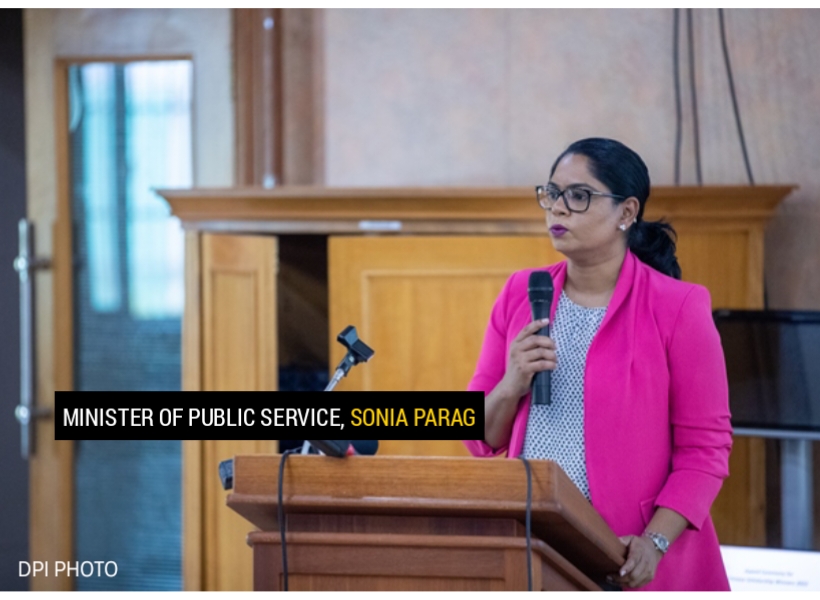Delivering remarks on behalf of President Irfaan Ali, Minister of Public Service, Sonia Parag, emphasized the importance of citizens placing their trust in the Government of Guyana (GOG) and the armed forces to safeguard the nation’s territorial sovereignty.
Speaking at a public awareness conference on the Venezuela/Guyana border controversy hosted by the University of the Southern Caribbean (USC) at the Arthur Ching Conference Centre (ACCC) in Liliendaal, Georgetown, Minister Parag commended the Guyana Defence Force (GDF) and Guyana Police Force (GPF), expressing pride in Guyana’s commitment to peace and diplomacy.
The minister addressed the historical border controversy, emphasizing Venezuela’s acceptance of the 1899 Arbitral Award for over six decades before contending that the 1899 award was “null and void” on the grounds of fraud/ coercion. She then criticized Venezuela for not presenting evidence of their claim at the International Court of Justice (ICJ).
To this end, she underscored Guyana’s dedication to the rule of law and peaceful coexistence with its neighbors.
“Guyana remains hopeful that demploacy will prevail and that Venezuela would accept the ruling of the and that they will not continue their aggression towards Guyana,” Minister Parag said.
Asserting that Guyana’s adherence to legality and justice will prevail, she highlighted the validity of the Arbitral Award and even pointed out Venezuela’s legislative acknowledgment, emphasizing their territorial demarcation. As such, Minister Parag said Venezuela’s actions are driven by greed.
Addressing Venezuela’s impeding referendum, Minister Parag deemed it lawful only if its content does not threaten regional peace or the sovereign rights of another nation.
Moreover, Minister Parag acknowledged Guyana’s united stance on Venezuela’s controversial claim and reassured citizens of the government’s commitment to protecting national territory. She also thanked the international community for condemning Venezuela’s actions.
In a firm stance, she conveyed that Guyana is a peace-loving yet resilient nation, prepared to defend its territory vigorously. To this end, the minister urged citizens to trust the government and armed forces in safeguarding the nation’s interests.
“We will not allow any stone to be left unturn in protecting our territory…I want to reassure you that the government is doing all that it can do and must do to protect the nation’s territory…we will not roll over and take anything,” Minister Parag concluded.
Furthermore, Independent Consultant, Dr. Clement Henry in his speech on the Guyana/Venezuela border controversy delved into the constructivist analysis, deciphering the intricate dynamics and historical context surrounding Venezuela’s claim over the Essequibo region.
“The Guyana-Venezuela controversy paints a picture of vulnerability and vehemence,” he said.
Dr. Henry noted Venezuela’s assertive aggression, challenging the 1899 accord with tempestuous tenacity. He said too that despite the 1966 Geneva Agreement, Venezuela displays belligerence, posing a continued threat to territorial integrity.
He emphasized that Venezuela’s actions is creating a David and Goliath scenario between the two nations. As such, Dr. Henry suggested that Guyana must navigate internal governance, national security, and international diplomacy while reinforcing its sovereignty and legitimacy.
Dr. Henry highlighted that Venezuela has demonstrated itself to be a state that is not adhering to international norms and conventions.
He said the presence of oil and other natural resources located in the Essequibo Region adds a material dimension to the border controversy.
“As an independent impartial body, the International Court of Justice involvement lends legitimacy to the resolution process. Its decisions are widely respected and Carrie’s significant weight in the international community which can be crucial for ensuring compliance by involved parties,” he added.
He underscored that decisions by the ICJ are binding and final; and are expected to be respected and implemented by all parties involved.
“This finality can provide a clear and conclusive ens to this longstanding controversy,” he noted.
Closing with recommendations, Dr. Henry advises Guyana to continue its legal approach, maintain diplomatic relations, ensure internal consensus, communicate effectively, pursue peaceful resolution, and leverage national resources. He also stressed the importance of indigenous rights considerations to build a compliant national identity.













